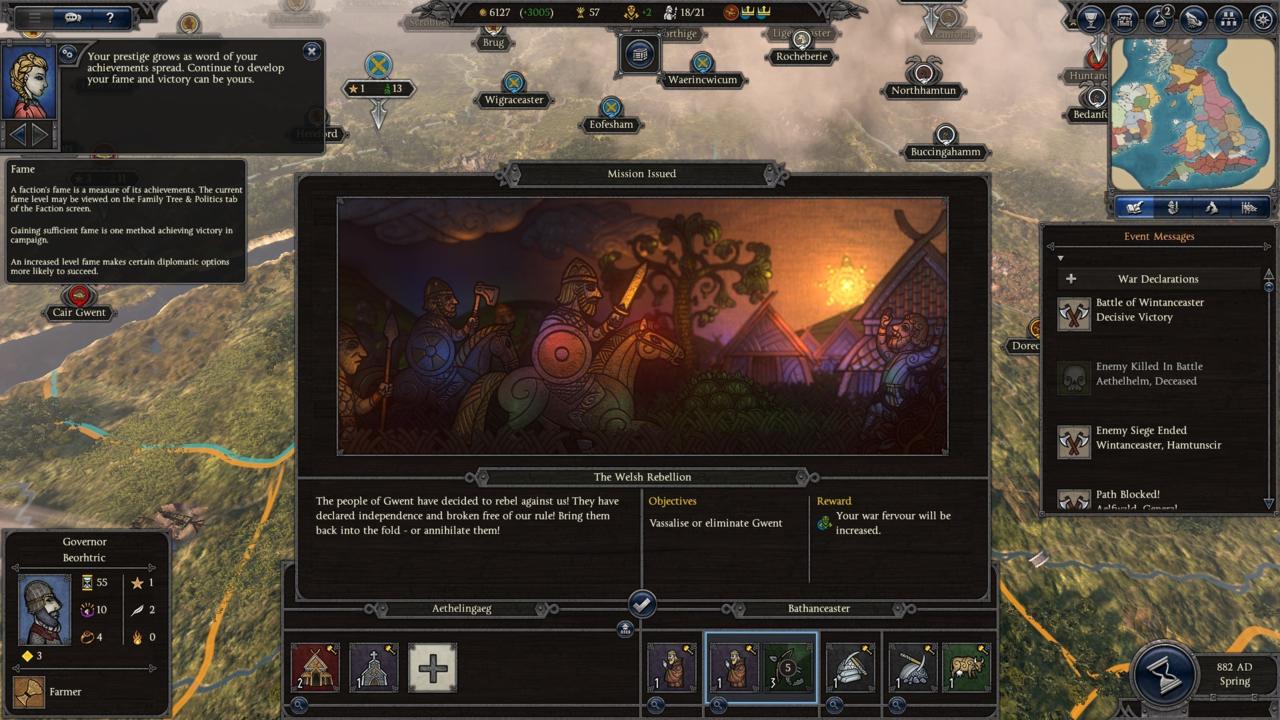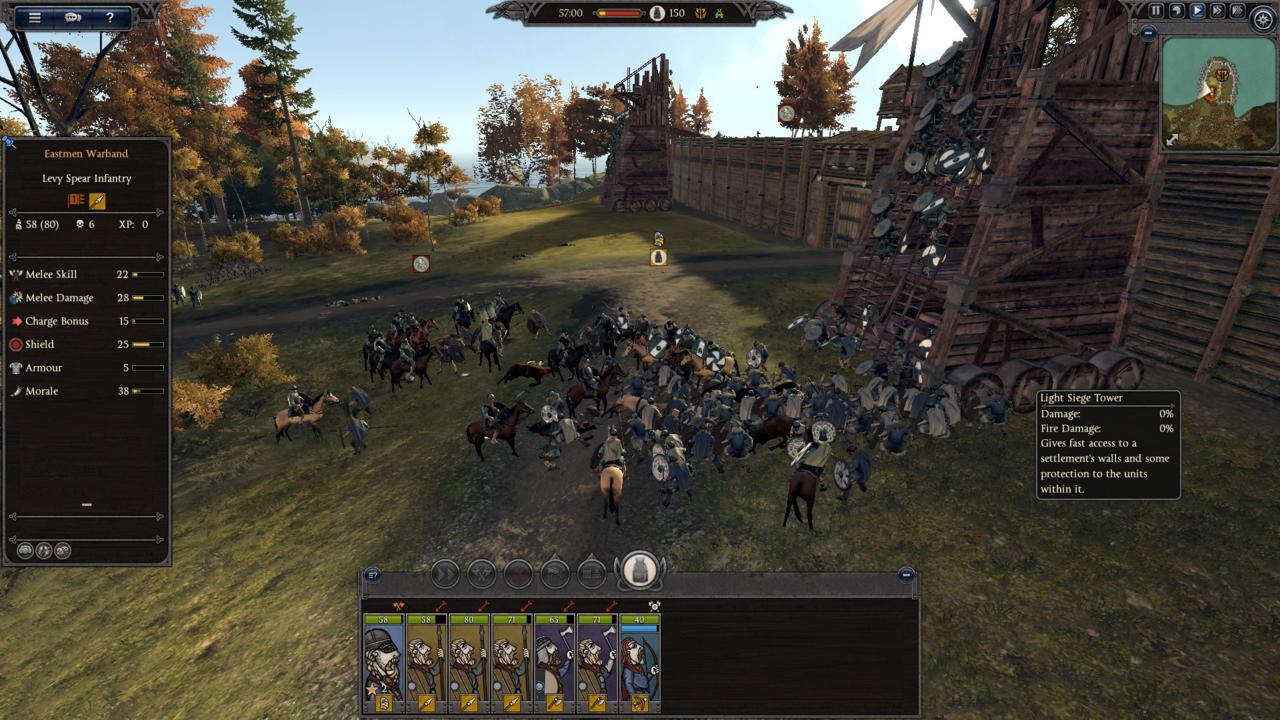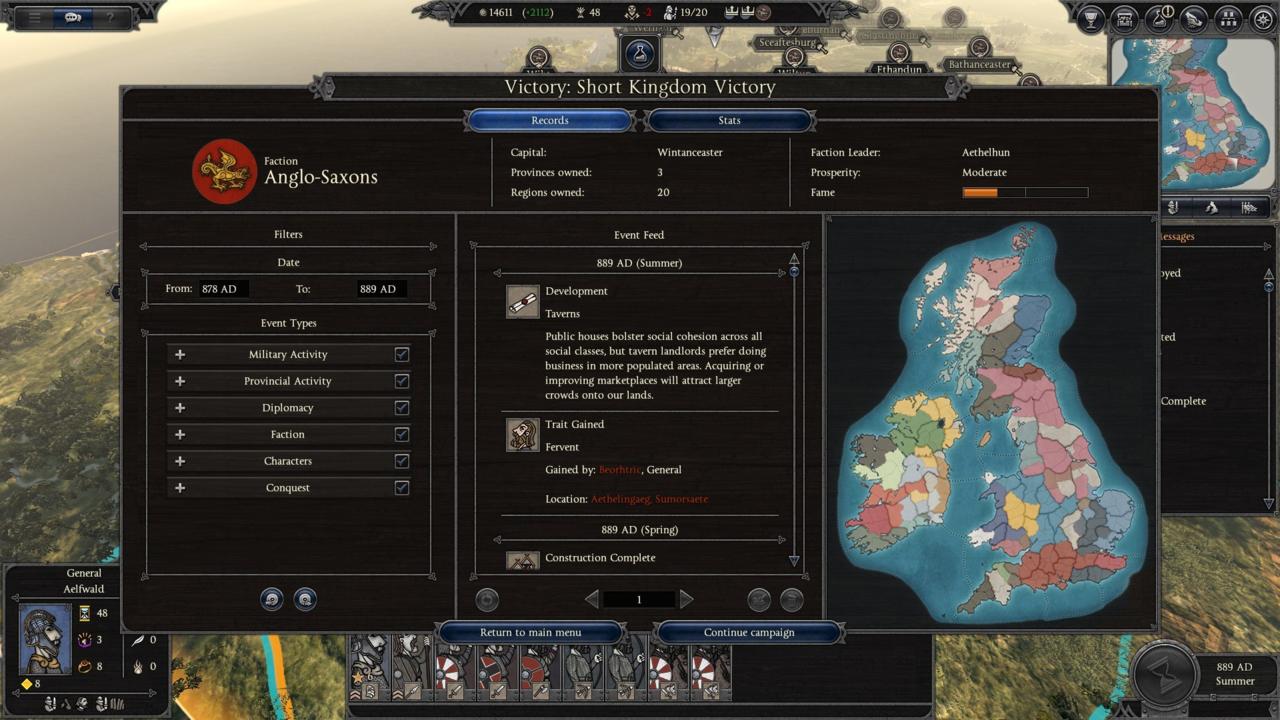The year is 880 AD. West Seaxe has flourished across the British Isles, and you’ve kept yourself in the hotseat of the English kingdoms through years of hasty allegiances, diplomatic marriages, and bribery. However, your adopted son Ricsige cuts a swathe through your settlements in some misguided idea of rebellion before meeting his end at your sword. Before you can grieve, however, a war horn sounds to the east and a barbaric force appears on the horizon. Resigned to taking up arms against lest your citizens turn on you for being a coward, you’ve got no choice but to face the invaders head on despite your exhaustion. As the Vikings advance on your skeleton crew of soldiers, you look once more across the rolling hills of the land that you call home and utter a silent prayer for your slain son. Later, after the crows have descended on your corpse and your countrymen have been enslaved, your former allies whisper about your useless heir and conspire to carve up your remaining settlements for themselves. This is Total War Saga: Thrones of Britannia, and your kingdom will never be the same again.
One of the core systems in Total War’s latest is the idea that your kingdom’s legacy is everything, for better or for worse. This isn’t revolutionary for the series, considering previous installments were fixated on the Roman Empire and its own bag of patriarchal succession woes. But the laser focus on lineage, loyalty and responsibility are more pronounced in Thrones of Britannia. It’s nothing short of engaging when all of its gears are in motion, and making sure that those gears are well-oiled is where the challenge lies. As is usual for Total War games, you’ve got to strike the right balance between warmongering and good governance. Your success is measured best by how your townsfolk are feeling, and they react organically to your decisions when you make them. If you lower taxes, they’ll undoubtedly get a boost to their satisfaction. If you’re not zealous enough, or too zealous for too long, their thirst for conflict will decline. If multiple things go wrong at once, you’ll potentially face a peasant uprising just as you’re knee-deep in a Viking-slaying sojourn.
Depending on the faction that you’ve chosen to play as, you’ll also have a number of other competing concerns vying for your attention, along with a corresponding cultural perk. Each cultural faction (there are five, each with two subsets) has its own way of charting the rise or fall of your empire, and they’re all distinctly different. For example, if you’re playing as the Welsh, protecting your culture will be the key factor to watch. If you’re walking on the wild side and playing as the Vikings, then it’s a matter of making sure that lesser kingdoms recognize your military accomplishments via lavish tributes. Keeping those respective meters high for your chosen faction will lead to positive increases in universal metrics like loyalty or even the melee abilities of your units. The differences between the cultures feel much more than skin-deep when these systems come into play, and they each guarantee a unique experience which incentivizes players to try their hand at other factions once they’ve tasted success.
These integral bits and bobs are also affected by the actions of your generals and governors, and Thrones of Britannia does its best to give you the tools you need to be politically savvy. Your henchmen are important, but acquiring them is now a precise science. Unlike the chance acquisition of previous titles, you get to place a follower into someone’s retinue when they level up. These peons assist you with improving specific empire metrics. If you’re struggling to feed your troops, perhaps give a governor a well-trained forager. If you’re looking to crack skulls in battle, then assign a Champion to a general for a little more steel. However, it's hard to keep your loyal subjects truly happy even if you make sure that they’re prepared for anything that the Isles may throw their way. Why? Well, they’re only human, and humans get greedy.

The aforementioned cautionary tale of Ricsige the Overambitious is just one of the many vipers in your kingdom’s nest that the game can throw at you. If your inner circle are too good at their jobs, their influence may eclipse your own and lead to some nasty confrontations if you don’t use espionage to discredit them in front of the populous. If you let them get too unhappy, then their loyalty suffers and they’ll make off with an army if you fail to placate them. Thankfully, the game gives you choices: You can secure loyalty through bribes, torture, or by doing what any good King would do, giving them estates. If things are looking particularly dire, you can even declare a new heir, though it pays to be cautious about the riff-raff that you’re letting into the royal bloodline. Managing the expectations of your inner circle is a balancing game that has surprising depth considering the immediacy with which your kingdom bears the brunt of your choices. It’s a credit to Creative Assembly that granting titles and destroying marriages never feels like busy work no matter how big your posse gets.
If you thought that your sons would be tough to manage, then your vassal states and potential enemies are an even bigger headache. While there’s no need to negotiate over imports and exports anymore, you still have to do your bit in ensuring good neighborly relations. You can suggest peace treaties, broker mutual military access, and even marry off an argumentative maiden to a frosty sovereign to appease them. You can also just as easily put an end to a friendship; each faction will react in either a positive or negative way to what you may see as a minor act (i.e. walking through someone else’s forest), and things can quickly turn into a diplomatic minefield. End up making a wrong choice and breaking an alliance? You’re signing yourself up for a beating from the very same monarchs that you kicked to the curb. While it can sometimes feel like you’re being pigeon-holed into specific diplomatic relationships depending on your story missions, the general freedom that you get to flip the bird at petty rulers adds a welcome touch of brevity to the proceedings.

For those who are chomping at the bit for combat, this sort of confrontation probably sounds more like a blessing than an indictment. Thankfully, Thrones of Britannia maintains the series' satisfying war mechanics. Formations for your units make their comeback in Thrones of Britannia, so if you sloughed through Warhammer and Warhammer II wanting the micro-play of the early Total War games, you’re in luck. The loop is conceptually familiar even to the uninitiated: you line your men up, point them at the enemy, and send them to meet either early deaths or victory spoils. Some factions have a leg-up on others at different points of the game, but the usual suspects of cavalry, ranged infantry, and sword-wielders populate the majority of your ranks.
Every location is rendered in great detail, even though the game relies on an aged engine. The camera’s range here is welcome; you can view the action from the top down or you can get up close and personal with the carnage. AI enemies respond reasonably intelligently to the actions of your troops--this isn’t a case where they throw themselves against your pointy weapons until they stop moving. However, there are some instances of the AI becoming prematurely spooked by aggression, and their defensive maneuvers of hiding behind trees and scattering unprompted can feel repetitive after consecutive skirmishes. Despite that, the mechanics around preparing for sieges and the economic minigame of raising your armies pad out the combat experience well as a whole, even if other elements of the game are more abrupt.

One of those such elements is the act of seeking victory itself. There are Short Victories and Long Victories, and they encompass the full gamut of empire metrics: you can win by getting really famous, controlling a certain portion of the map, or simply by sticking around long enough to give the Viking horde what for. Getting a Short Victory can sometimes feel like an accident; a win is in sight if you manage to inherit a foreign landmass, and this can happen through no effort of your own if your chosen target is unlucky enough to incur the wrath of someone stronger. However, the factions all have their own starting difficulty indication that appears to be mostly accurate, so it’s easy to see where you should jump in if you have any doubts about whether you’ll be sufficiently challenged.
Once you’ve gained a victory, the forward momentum of the game seems to slow. While you may previously have been fed missions to move events along, your trusty advisor seems happy to largely occupy the back seat of your chariot while you tramp around Britain looking for people to stick swords into. If you’re lucky enough to have fallen into multiple win conditions, you’ll likely find it hard to motivate yourself to keep going; the AI may not be strong enough to keep up. On the other hand, it’s just as easy to taste only defeat in a playthrough, as the AI is quick to bare its teeth and to close in on weak or unguarded settlements. Regardless, it’s prudent to not take victory for granted: a decisive win could spell an exhausted army ripe for the routing before an in-game year passes.

Thrones of Britannia is an exciting experience despite the cuts to integral components of the Total War series, such as city planning hinging on military needs, specific building customization, and expanded intrigue options. But this has given Creative Assembly room to focus on enhancing parts of the strategy experience that aren’t quite as impenetrable to newcomers, and to allow the series to return to some of the beloved parts of previous historical games to balance out its newer, slimmer form. While there are minor issues with AI, and pacing suffers when you’ve comfortably gotten the upper hand, this is still a worthy and engaging contribution to the Total War stable that has successfully taken its cues from history’s winners and losers alike.









